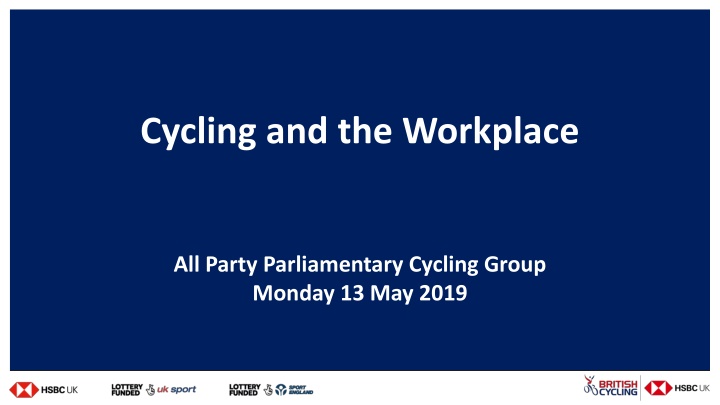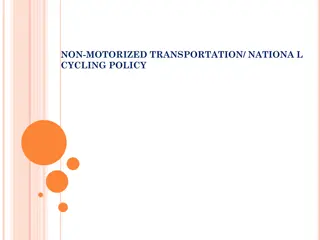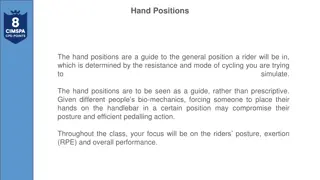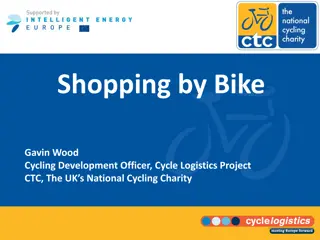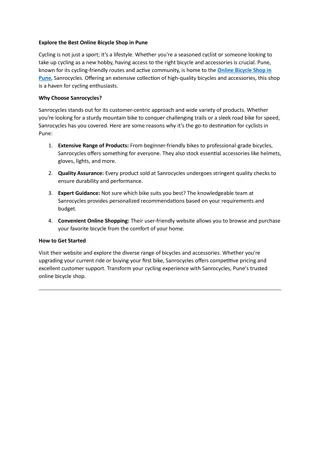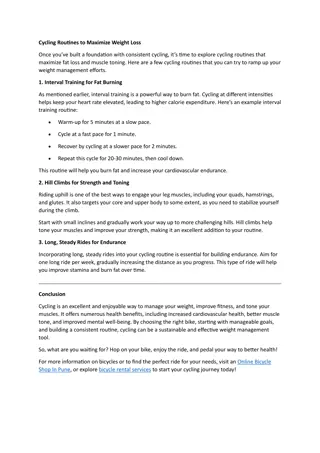Cycling and the Workplace
British Cycling and HSBC UK have joined forces to promote cycling across the UK through various initiatives such as cycling festivals, bike loan schemes, and innovative research projects. The Cycle Nation Project aims to increase cycling participation and evaluate the associated benefits, focusing on long-term sustainability and improved health outcomes.
Download Presentation

Please find below an Image/Link to download the presentation.
The content on the website is provided AS IS for your information and personal use only. It may not be sold, licensed, or shared on other websites without obtaining consent from the author.If you encounter any issues during the download, it is possible that the publisher has removed the file from their server.
You are allowed to download the files provided on this website for personal or commercial use, subject to the condition that they are used lawfully. All files are the property of their respective owners.
The content on the website is provided AS IS for your information and personal use only. It may not be sold, licensed, or shared on other websites without obtaining consent from the author.
E N D
Presentation Transcript
Cycling and the Workplace All Party Parliamentary Cycling Group Monday 13 May 2019
British Cycling and HSBC UK Ambition to create the biggest single contribution to a greener, fitter, healthier Britain over an eight year partnership, inspiring two million people to ride. HSBC UK s societal partnership with British Cycling is unlike traditional sponsorship. Through the partnership, HSBC UK wants to bring a broad range of benefits to society through enabling more people to get on their bike.
British Cycling and HSBC UK HSBC UK Let s Ride cycling festivals 14 city centre events across the UK this summer Launched our interactive Ready Set Ride toolkit Delivered online and through schools alongside the Youth Sport Trust Birmingham Bike Banks Bike loan scheme in our home city 2,500 bikes each year
British Cycling and HSBC UK Business networks Convening networks of large employers in cities across Britain Our Cycle Hub app Employee engagement portal for 34,000 HSBC UK staff Cycle Nation Project Innovative research with the Universities of Glasgow and Edinburgh
University of Glasgow research project
The Cycle Nation Project In 2017, British Cycling and HSBC UK have jointly engaged the Universities of Glasgow and Edinburgh to work in collaboration with the British Cycling insight team on the Cycle Nation Project. Aim to conduct a comprehensive, systematic research project with an overarching aim of increasing participation in cycling and evaluating the benefits of such an increase.
The Cycle Nation Project The project has three aims: To produce sustainable long-term increases in the number of people cycling. To produce sustainable long-term increases in the number of cycling journeys (for transport or for leisure) across the United Kingdom. To provide causal evidence of the extent to which sustained increases in cycling improves health, wellbeing and productivity outcomes.
The Cycle Nation Project PHASE 4 Roll out and long-term implementation PHASE 2 Feasibility and pilot trials PHASE 3 PHASE 1 Development Large-scale long-term trials
The Cycle Nation Project Phase 1: Reviewing what is already known Understanding the context Designing the interventions
The Cycle Nation Project There is huge potential to increase cycling participation with the provision of appropriate facilitators and incentives. A majority of the UK population are current or recently lapsed cyclists 28% of the UK adult population over 14 million people currently cycle less than once per month and would like to cycle more regularly
The Cycle Nation Project The largest health gains occur when those who do little or no cycling start to cycle more often. Cycling is associated with lower risk of mortality, cardiovascular disease and type 2 diabetes. People who cycle have fewer days of sickness absence, lower stress and higher quality of life. Increasing cycling has would produce substantial societal and economic benefits.
The Cycle Nation Project Limitations to existing evidence Most studies have been observational rather than interventions. Intervention studies have been small and short-term. Extent to which pragmatic, real-world cycling interventions could have a sustained impact on our health (and productivity) is unclear. Randomised controlled trials are the gold standard.
The Cycle Nation Project Infrastructure plus behaviour change delivers the greatest benefits. Barriers to cycling occur at multiple levels both individual and environmental. Investing in infrastructure is cost-effective, but is expensive and takes time and is probably insufficient on its own. Integrated packages of interventions targeting individuals and social environment (as well as infrastructure) are likely to be most effective More research is needed on the most effective individual and social level interventions to complement infrastructure investment.
The Cycle Nation Project Systematic approach to identify and characterise all interventions ever tried to increase cycling participation. 14,407 potential studies screened. 132 studies identified meeting inclusion criteria.
The Cycle Nation Project Encourage use of existing cycle hire schemes Provide cycle hire schemes and e-Bikes schemes Skills training or Team challenge Build bollards and traffic calming Investment and funding strategies One to one counselling Travel planning Install route signage Renovate cycle paths Build local facilities (bike racks, showers, etc) Provide bikes (or discounted bikes) or e- Bikes Policy and legislation (e.g. speed limits) Make streets cycle friendly (painted boxes) Large events (e.g. Ride London) Education and awareness Financial incentives Build cycle networks Build cycle paths Levels of Socio-ecological model Social Physical environment Policy Individual
The Cycle Nation Project Encourage use of existing cycle hire schemes Provide cycle hire schemes and e-Bikes schemes Skills training or Team challenge Build bollards and traffic calming Investment and funding strategies One to one counselling Travel planning Install route signage Renovate cycle paths Build local facilities (bike racks, showers, etc) Provide bikes (or discounted bikes) or e- Bikes Policy and legislation (e.g. speed limits) Make streets cycle friendly (painted boxes) Large events (e.g. Ride London) Education and awareness Financial incentives Build cycle networks Build cycle paths Levels of Socio-ecological model Social Physical environment Policy Individual
The Cycle Nation Project Focus groups and interviews held to identify the barriers to cycling and components of interventions which would facilitate them to increase cycling levels. Developed an integrated, multi-component cycling intervention programme.
The Cycle Nation Project PHASE 4 Roll out and long-term implementation PHASE 2 Feasibility and pilot trials PHASE 3 PHASE 1 Development Large-scale long-term trials
The Cycle Nation Project Phase 2: Pilot trial to assess feasibility of delivery, uptake and acceptability and impact on levels of cycling over the short-term. Test all procedures for measurement of health, economic and productivity outcomes in Phase 3 trial. Ambition to provide a gold-standard for use in a national roll-out of Cycle Nation Project in other settings, helping to inform policy decisions.
State of Cycling Reached the 150,000 member milestone for the first time last week. Surveyed our membership in January 2019 to better understand the experiences of Britain s cyclists, focusing on three main areas: safety, leadership and commuting. Had over 15,000 responses, and released the report publicly last week.
State of Cycling My employer Encourages me Makes it easy Could do more 0 10 20 30 40 50 60 70 80 90
State of Cycling 90 80 70 60 50 40 30 20 10 0 Showers and changing Secure parking Cycle to Work Mileage incentive Flexible hours Flexible dress Workplace champions Parking charges Route support Cycle hire
State of Cycling But what s in it for the employer? In total, 87% said that cycling to work helps them to perform better in their role. On top of this, over half (53%) say that having the necessary facilities to enable them to cycle to work is a big factor in their choice of employment.
